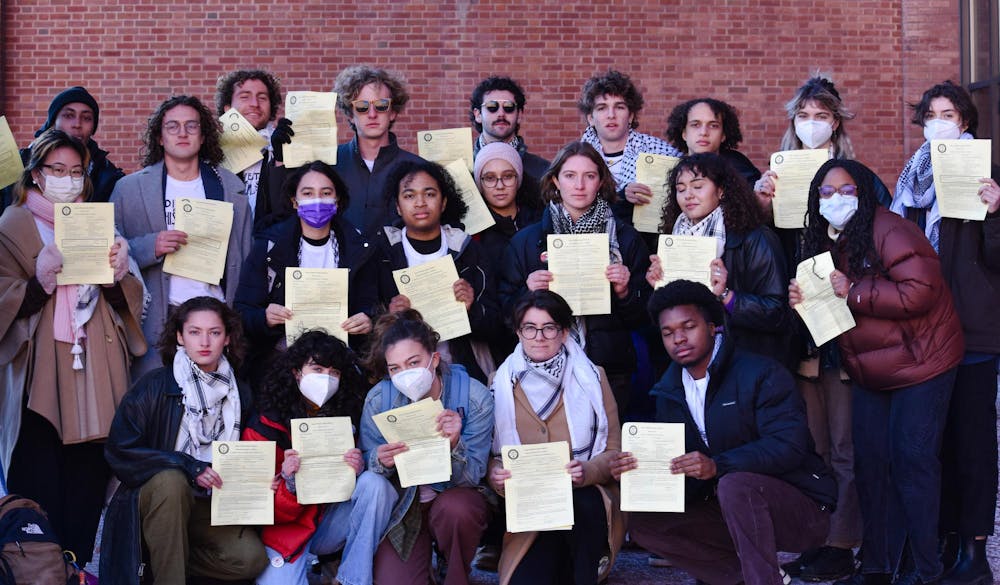The remaining 21 of the 41 students arrested at a Dec. 11 University Hall sit-in for divestment and ceasefire were arraigned at 9 a.m. Wednesday. The other 20 students were arraigned on Monday. All 41 students pleaded not guilty to “willful trespassing within school buildings” and received a pretrial conference date of March 5.
An hour before the arraignment, approximately 75 students, faculty and staff members gathered on the Main Green in support of the students who were arrested. The group then walked to the Providence 6th Division District Court, where the arraignment took place.
“It's great to see people remaining energized to come out to things even at eight in the morning,” said Garrett Brand ’26, one of the students who were arraigned. His mom came to support him as well.
“She's supportive of me making my choice to protest and all that, but it's a lot for her as a Black parent to see her son wrapped up in the legal system,” Brand said. “She really wanted to be there, and I'm happy to have her.”
At an Undergraduate Council of Students town hall last November, University Investment Office officials said that Brown does not “directly invest in any weapons manufacturers” or companies with direct ties to Israel. A large portion of the endowment is invested in external managers with undisclosed, confidential portfolios.
University Spokesperson Brian Clark previously wrote to The Herald that the University is “confident that our external managers have the highest level of ethics and share the values of the Brown community, including the rejection of violence.”
At the arraignment, the students were granted permission to travel out of state, and all students agreed to return to court for future proceedings and give up the right to an extradition trial in their home state. Students also received a personal recognizance set at $1000 — a release without bail unless they fail to make future court dates.
“We weren't there for terribly long, but it's just the very beginning of what is going to be an entirely unnecessary and arduous legal proceeding,” Brand said,
He believes the proceedings are “wasting the city's taxpayer money for Brown to prosecute its own students.”
University Spokesperson Brian Clark did not respond to request for comment on the protesters’ characterization of the proceedings.
Hanna Aboueid ’24 worries that the charges “might take the spotlight off of the real issue, which is Palestine and divestment,” she said. “We're going to do everything we can to make sure that this isn't used as a distraction … to siphon our energy and our momentum.”
Abouied reemphasized claims made by students arraigned earlier this week, highlighting the racial differences between JFCN and BDC.
“Our group is made up of a lot of people of color, especially Black and brown students … much more so than JFCN was,” she said. According to Abouied, BDC ensured that they “were abiding by University directives in the same way that JFCN did, and for them to be painting this narrative, it just feels very racialized.”
She fears that this response may “set a very bad precedent for student activism on campus, but especially student activism among Black and brown individuals who are already criminalized at large.”
Clark previously pushed back against similar implications of racial bias made at the Monday trial.
“Respectfully, this is a disingenuous claim,” Clark wrote in an email to The Herald on Monday. “At multiple points on Dec. 11, both verbally and in writing, University leaders made abundantly clear to the students that, while arresting students is not an action that Brown takes lightly, Brown would proceed with arrests and criminal charges if they chose not to leave the building after 5 p.m.”
At Tuesday’s Brown University Community Council meeting, Abouied, Brand and other audience members confronted President Christina Paxson P’19 P’MD’20 on the University’s decision to press charges against the sit-in demonstrators, The Herald previously reported.

Ryan Doherty is the managing editor of digital content and vice president of The Herald's 135th editorial board. He is a junior from Carmel, NY who is concentrating in chemistry and economics. He previously served as a university news and science & research editor, covering faculty and higher education.

Tom Li is the editor-in-chief and president of The Herald's 135th editorial board. He is from Pleasanton, California and studies economics and international and public affairs. He previously served as a metro editor, covering the Health & Environment and Development & Infrastructure beats, and has worked on The Herald's copy editing, editorial page board, design and podcast teams.





